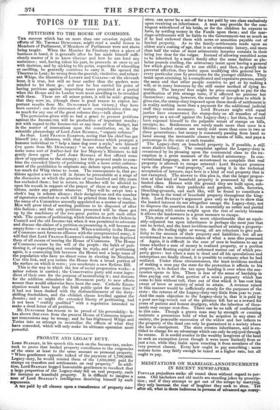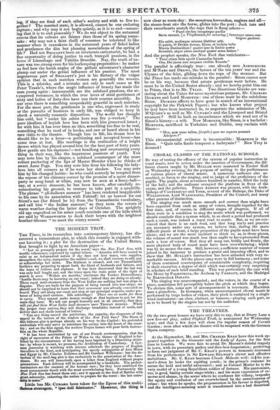MEDITATIONS ON MARRIAGE-ANNOUNCEMENTS IN RECENT NEWSPAPERS.
POPULAR prejudices strike all round them without regard to per- sons. Old bachelors and old maids are standing jokes by prescrip- tion; and if they attempt to get out of the scrape by marrying, they only increase the roar of laughter they seek to shun. Yet after all, what is there ludicrous in persons of advanced age marry- ing, if they are fond of each other's society and wish to live to- gether? The married state, it is allowed, cannot be one enduring rapture ; and why may it not begin quietly, as it is to end—assum- ing that it is to end peaceably ? We do not object to the autumnal crocus that its colours are fainter than those of its spring name- sake : why may not a faint thrill of romance be tolerated in like manner when it reawakens in the autumnal years of faded ladies and gentlemen the dim but pleasing associations of the spring of life ? Had not SMOLLETT been an inveterate caricaturist, he had a fine opportunity of doing justice to such tranquil passions, in the loves of Lismahago and Tabitha Bramble. Nay, the truth of na- ture was too strong even for his burlesquing propensities : he makes us feel how the harsh angles of the gallant adventurer's character plump out under the genial influence of his passion. The most ungenerous part of SMOLLETT'S jest is his flattery of the vulgar opinion that in such matches women are generally the wooers. This is a mistake, and a mistake not only in such cases as Sir Peter Teazle's, where the magic influence of beauty has made the man young again : innumerable are the subdued passions, the at- tempered romances, in which the true loves of staid gentlemen of sixty and ladies of forty-five have run their courses smoothly. In our eyes there ie something unspeakably graceful in such matches. For the most part, the gentleman is one who, engrossed in study or the pursuits of business in early life, was obliged to keep in check a naturally romantic disposition. The world has thought him cold, but "under his ashen hore was fire y-wreken." The pure idealism of boyish love has been with him preserved intact ; for with him it has ever been an idea, something too fine to be real, something that he read of in books, and saw or heard about in his rare visits to the theatre. Though late in life, his dream how he should like to be a lover—a petitioning and accepted lover—has come true at last. His marriage is the realization of a bright dream which has played around him for the best part of forty years. How gentle are his raptures !—not headlong and overturning every thing in their way, like the impetuous passions of youth. You may note him by his simper, a subdued counterpart of the more robust puckering of the lips of Master Slender when he thinks of sweet Anne Page. You may note him from his following his lady- love into all corners as if he were her shadow. You may note him by his changed habits : he who could scarcely be tempted from the repose of his chimney-corner by the promise of a quiet dinner- party or snug hand at whist, may now be seen at a fancy-ball- nay, at a soiree dansante, he has been known, after carefully re- connoitering his ground, to venture to take part in a quadrille. The phrase " all-hallown summer" has been rendered inapplicable to his case by its association with Falstaff: let us borrow for our friend's use (for friend he is) from the Transatlantic vocabulary, and call him "the Indian summer," as they term the return of warm weather during the latter days of October. The sprightly old age engrafted on his sober youth reminds one of the hills which are said by WORDSWORTH to deck their brows with the brightest heather-blooms "to meet the wintry season."

























 Previous page
Previous page